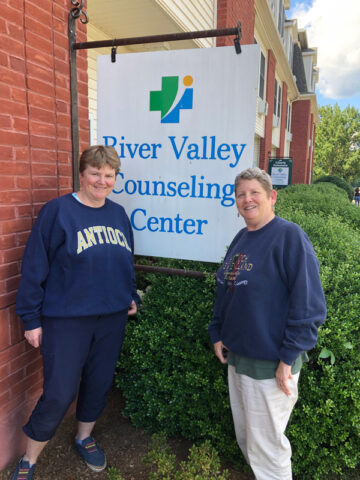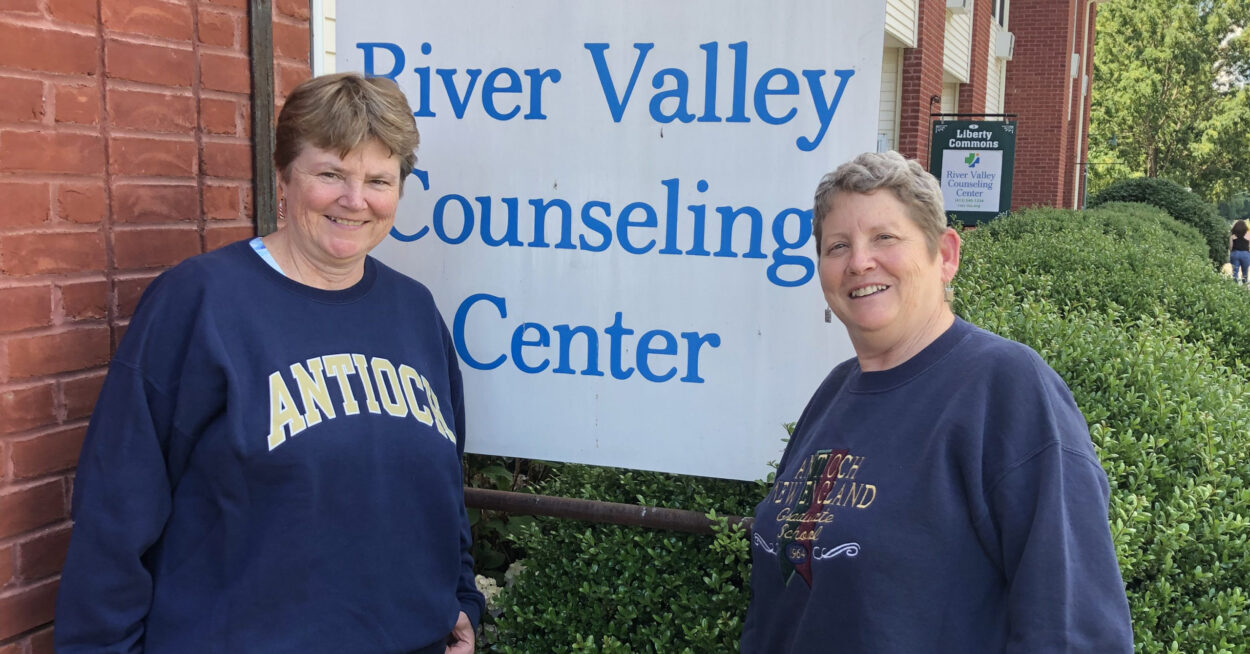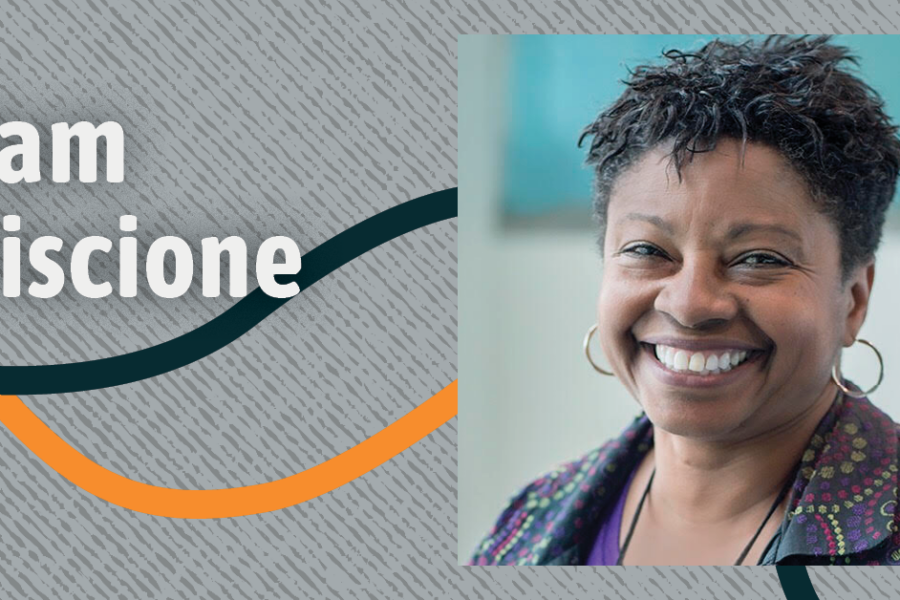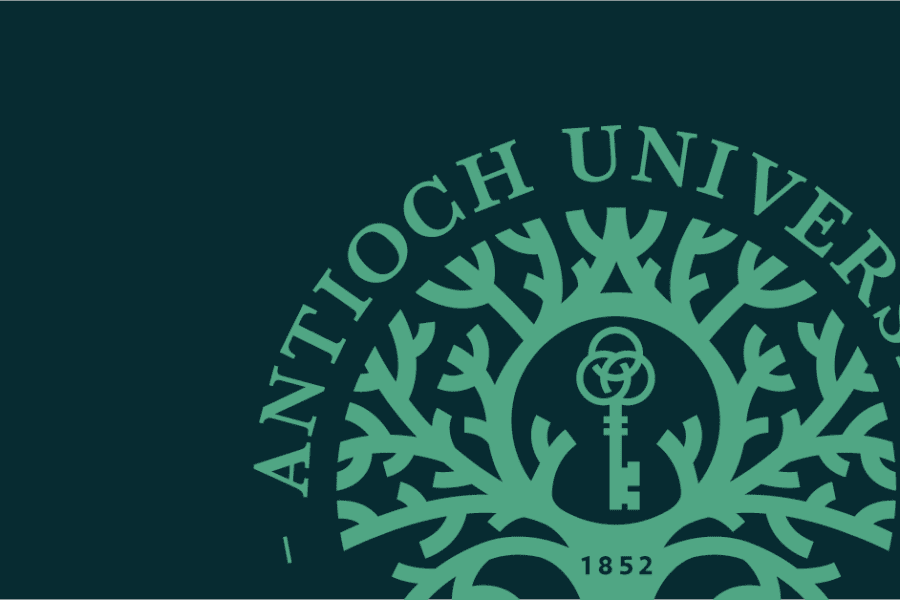Susan M. Quigley, PsyD and Elaine F. Campbell, PsyD, both graduated from Antioch New England’s Clinical Psychology Doctoral Program in 1999. They supported each other through their studies and collaborated on their doctoral dissertations. Over the years they’ve maintained a professional exchange and friendship that is a testament to its beginnings at Antioch. Like a river that divides and later merges, the women pursued different counseling paths post-graduation, but they never lost touch, and they’re now working together again.
Campbell has been the Assistant Executive Director at River Valley Counseling Center (RVCC) for six years and recently recruited Quigley to be the director of one of RVCC’s newer mental health clinics, which is located in Easthampton, MA. Professor and Director of Practica for the PsyD program, Dr. Lorraine Mangione, views their stories as inspiring examples of hard work, commitment, friendship, and collaboration. “That is a great Antiochian journey!” she says.
Innovating and Improving Mental Health Services
One of the main things that drew Campbell to the program was its focus on bringing better care to underserved and marginalized populations. Before embarking on her doctoral degree, she worked in mental health in inner-city Cleveland, in a sheltered workshop, and in Boston in both a psychiatric hospital and a psychiatric group home that was focused on women who were victims of trauma. These experiences opened her eyes to the limitations of available services for those communities. They led her to seek further education with the goal of eventually helping to create better treatment programs for them.
“Sue helped me pilot my dissertation at a Domestic Violence shelter in Greenfield, MA. Both of us have continued our work in the trauma field ever since!” says Campbell, who has specialized in trauma work for her entire career, across all populations, including veterans and first responders.
In her position at RVCC, she’s followed through on her early career goals; RVCC partners with many local agencies, providing mental health services to the clients of WestMass Elder Care Inc., LifePath, Womanshelter/Companeras, Enlace de Familias, Boys and Girls Club of Greater Holyoke, and ROCA. Campbell’s renewed career goals include helping RVCC become the best organization for treatment and training and for it to truly serve the specific needs of the communities within which they work. “RVCC is currently leading the way in a train the trainers program focused on the ACE (adverse childhood experiences) program,” she says. “We are working to create resilient, self-healing, trauma-informed communities.”
Community Mental Health & Rural Community Psychology
Before attending Antioch University, Quigley received her Master’s degree in Rural Community Psychology, subsequently working in community clinics, schools, and college counseling centers for ten years. “My training in Rural Community Psychology was a major influence on my valuing community-based work and grew my appreciation for the challenges people in underserved communities face to obtain adequate mental healthcare,” she says. “I believe this was the spark for my passion for working in community mental health.”

She completed her doctoral internship at a community mental health center, where she then stayed to work for more than twenty years. She received her internship placement through her mentors, Dr. Dusty Miller and Dr. David Arbeitman, faculty at the New England campus. The fact that her new job shares that same thread feels like part of an ongoing narrative.
“In my new adventure with River Valley Counseling Center, I am reconnecting with my Antioch roots in my work with Dr. Elaine Campbell, who recruited me to this position and with whom I worked side by side through our doctoral program,” she says.
In her position at RVCC, Quigley plans to foster a strong sense of community among staff within the clinic and develop the strengths of the existing program. She aims to meet the fast-growing need for services and increase RVCC’s capacity to serve a greater number of people in the local community.
Improving Accessibility & Giving Back
Quigley and Campbell share the vision of not only creating an environment where good mental care is accessible to all but one where barriers are removed for people hoping to enter the field as professionals. And these aims are interrelated. For example, Quigley would like to see the Examination for Professional Practice in Psychology (EPPP) – the licensing exam required to practice in the US – become more accessible for culturally and linguistically diverse applicants, such as Puerto Rican trained psychologists. It’s not simply a language barrier issue but one of cultural sensitivity. Relatedly, Campbell cites concerns over barriers to care created by health insurance companies. “They dictate care… get rich… and [in the meantime] clients aren’t provided with what they need to heal.”
Throughout their careers, both doctors have been committed to training future generations of psychologists and therapists, which Campbell attributes to their amazing Antioch mentors. “They made sure we had so many opportunities to grow and learn under their leadership,” she says. “We want to provide the same for our trainees.”
Campbell and Quigley had the same chair/ advisor for their dissertations, Dr. Dusty Miller, whom Campbell describes as a leader and innovator in the field of trauma in clinical psychology. Both women highly valued Miller’s mentorship as formative for their careers, and in training emerging psychologists, they have the opportunity to continue that legacy.
In 2021 the RVCC clinic in Easthampton (the one Quigley is now running) added a doctoral practicum program, which currently has some Antioch student participants. “Sue is an amazing psychologist and supervisor,” Campbell says, “and I am thrilled to have her leading this program to bring along the next generation of psychologists!”
RVCC recently secured the National Health Service Loan Forgiveness program for licensed clinicians–including psychologists. The program includes $50,000 toward student loans for a two-year commitment to work with the underserved population. This is just one more way they are striving to help the next generation of psychologists.
Throughout their careers, Campbell and Quigley have consistently worked toward improving the accessibility of care and training and the quality of care and training. While the obstacles may be daunting, they can both look back and see how far the field, and they, have come.



